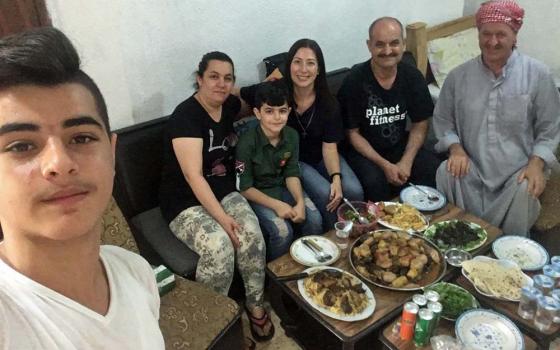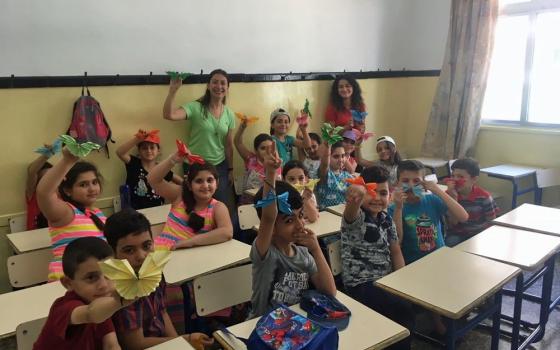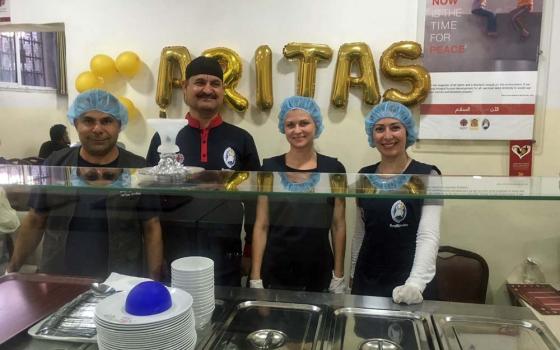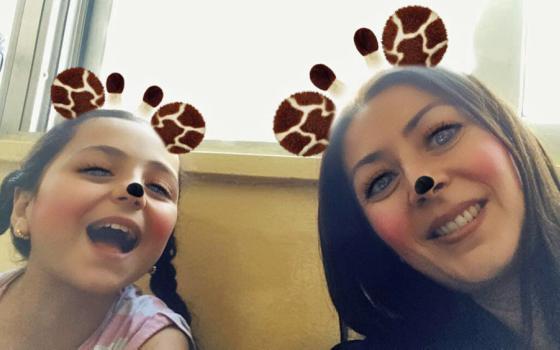Amman, Jordan — Notes from the Field includes reports from young people volunteering in ministries of Catholic sisters. A partnership with Catholic Volunteer Network, the project began in the summer of 2015. This is our sixth round of bloggers: Natalia Liviero is a volunteer with VIDES+USA serving in the Middle East, and Janie Rosko is a Humility of Mary volunteer serving within the Ursuline Ministries in Youngstown, Ohio.
______
Jordan has received more than 1.25 million refugees from Syria and more than 130,000 from Iraq as a consequence of the ongoing wars in those countries. Families fled their hometowns either for safety issues when the Islamic State group invaded Syria and Iraq or for lack of economic opportunities because of the wars.
As mentioned in my previous blog post, part of my mission in Jordan was to work in ministry to Iraqi refugees. In my months working with refugees, I learned how Christians have been displaced from Iraq by the Islamic State group, fleeing just with what they were wearing, and their frustration with the international community — mainly with the United States — for the time it is taking to be resettled overseas.
The Salesian Sisters have two houses in Jordan: one in Amman, and another one at the Our Lady of Peace Center, near the airport. The house in Amman, where I stayed, opened its doors to a priest from the Chaldean Church of Iraq, Abouna (or Father) Zaid, and Iraqi refugee children so they could have a Salesian oratorio, or youth ministry, on Friday mornings.
Sister Nuha at the peace center and another priest, Abouna Zuheir, guide a second oratorio also on Friday mornings at a Christian school in Amman that opened the doors to Iraqi refugees so kids would not miss school. Approximately 300 kids and youth participate at those two oratorio and are brought to the school and sisters' house in small yellow school buses.
The oratorio starts with the kids playing at a playground with the Iraqi youth who lead the activities, then they gather by age and sing and pray before going to their respective classrooms to receive catechesis.
I met Abouna Zaid in May at the celebration for the fourth anniversary of the election of Pope Francis I mentioned in my previous blog post, and on the following Friday, I spent about two hours with him during the oratorio to understand his work with refugees. He took me to some classrooms and introduced me to the kids, and he asked me to speak about my mission with the 8- to 10-year-olds. I asked them to ask me questions, and they were participative and joyful. The kindness of Abouna Zaid toward the children and how much everyone loves him touched me.
It's a small world
In June, Nataly, the woman who lives at our house and a leader at the oratorio with Sister Nuha, invited me to a day outside of Amman with Iraqi refugees. Since it was supposed to be a fun day and they didn't know me, I didn't ask questions about the refugees' situation or tell them much about my mission. I really wanted them to have fun without being reminded they were refugees.
The fun day was at a pool, but Nataly didn't know that was where we were heading, so we dressed like we were going for a hike. The Iraqi girls were welcoming and gave us shorts and T-shirts to swim in so we could enjoy the pool with them. Because the Iraqi culture is conservative, the women wear more clothes to swim than women do in Western countries.
Since I was on mission, besides from swimming and getting rid of the intense heat of Jordan, I decided to teach the women how to float in the pool because the majority don't know how to swim. Men, on the contrary, wore Western-style swimsuits and swam well. After the pool, the girls set the tables with delicious homemade Iraqi food, and after lunch, Nataly and I played cards with the guys.
Suddenly, the "Jordan world" got smaller. I was happy to see two of the Iraqi refugees with whom I worked at the Caritas Restaurant of Mercy, and at the pool, a young boy said, "Do you remember me?" He recognized me from the time I visited Abouna Zaid's oratorio in May.
An Iraqi day
In August, I could finally participate at the oratorio with Sister Nuha for three consecutive Fridays. I played with the kids, danced with the youth leaders, participated in arts and crafts, talked with the kids and had meaningful conversations with the teachers and youth leaders, who were warm and welcoming.
On Aug. 25, I visited Abouna Zaid's oratorio before departing to my current mission in Nazareth. Then, I went on one of the yellow school buses for refugees to Marka, one of the neighborhoods in Amman where Iraqi refugees live, to the house of an Iraqi refugee with whom I worked at the Caritas Restaurant of Mercy. He had invited me for lunch to meet his family of four.
His wife cooked delicious Iraqi food, including stuffed vegetables with rice and sautéed chicken liver. We also had coffee and seeds, which is common in the Middle East, and we spoke the whole time in Arabic with few translations from our cellphones. The invitation was meaningful to me since my mission is about touching other people's hearts. They opened the doors of their house to me and made me feel like family.
They told me about their situation: They fled Qaraqosh, Iraq, three years ago, and they showed me pictures of their house after it was ransacked by Islamic State militia. They were anxiously waiting for President Donald Trump's travel ban to be lifted so they can start over in Michigan or Nevada.
I didn't want to arrive with empty hands, but they didn't want me to bring anything, so I took some Iraqi sweets that an Iraqi refugee friend had given to me as a farewell gift. They were happy with the sweets — home food! I was thankful to them for the invitation, and they were happy I had enjoyed "an Iraqi day."
Inspiring optimism
On my last Sunday in Jordan in early September, I went to Abouna Zaid's Mass at the LaSalle Church to experience for the first time the Chaldean rite. The church was full. I met some of the Iraqis I have previously met during my stay in Jordan and some new ones who voluntarily told me their stories about when they left Iraq.
Over the summer, I also became friends with five Iraqi refugees at the Caritas Restaurant of Mercy. Sometimes they made Iraqi food for the volunteers and were happy to see us enjoying it. They told me their situations and asked questions about the United States, since some had applied to resettle there. However, their cases were on standby because of the U.S. travel ban.
Despite the struggles the Iraqi refugees I met face, I found them to be kind, warm, smart, well-educated, and optimistic amid their hard situation living in a country where they are not allowed to work. The group from Sisters Nuha's oratorio will most likely resettle in Australia, Canada or Europe, and the group from Abouna Zaid, God willing, will be able to move to Michigan, California, or Nevada.
[Natalia Liviero is a volunteer with VIDES+USA serving in the Middle East.]



